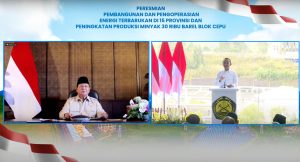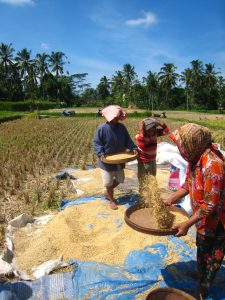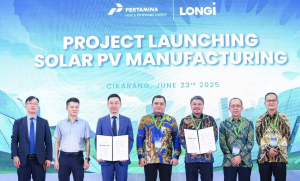Jakarta – Monika Maritjie Kailey is a diminutive figure with a towering spirit. She has devoted her life to protecting the biodiversity and cultural heritage of the Aru Islands in Maluku. Today, she stands among global leaders at the Conference of the Parties to the Convention on Biological Diversity (COP 16 CBD) in Cali, Colombia. But back in her home, she’s a fierce defender of her community’s rights and a guardian of the islands’ rich ecosystems.
Growing up, Monika was far from the average girl in her village. While most young girls learned to cook alongside their mothers, Monika followed her father into the forests and out to sea, Contentro PR shared her story on Thursday, October 24. At seven, she vividly recalls sleeping in caves with her father, collecting swiftlet nests for trade. Her father taught her how to track wild animals, skills rarely acquired by girls in her village.
“On the way from one cave to another, Papa taught us to read the tracks of various game animals, such as deer and wild boar. I was also taken hunting, watching hunters drive forest animals away from archers,” Monika recalls.
These experiences, she says, shaped her into a leader, someone who learned responsibility through nature. She became a role model for her five younger siblings, and her knowledge of the forest and the sea set her apart.

Living in harmony with nature
For Monika, nature and humanity are inseparable entities that must live in balance. In Aru, the sea and forests sustain the people. They hunt wild boar and deer, but only as needed, preserving the delicate ecosystem. Farming is a vital part of life, as is the traditional medicinal knowledge from the forest.
“The people in our village depend on the sea and the forest. In the forest, we make plantations to grow food, such as cassava, sweet potatoes and taro. In the forest, we also get medicinal plants if we can’t reach medical facilities,” she said.
One central practice that has kept Aru’s environment healthy is its adherence to traditional laws. For example, before cutting down trees to build homes, locals must plant new ones, ensuring sustainability. The sea, too, is generous, providing fish, sea cucumbers, lobsters, and seaweed—resources that the community harvests while preserving its way of life.
Monika’s village, Fatlabata, is deeply rooted in its traditions, which she holds close to her heart. Rituals and ceremonies are a part of everyday life, reminding the people of their bond with the land. “We believe the land is our mother’s belly,” Monika explains, referencing the local term “jina tubir.” “Just as a mother nourishes her children, the land provides for us, and we must care for it as we care for her.”
Monika’s commitment to these traditions drives her activism. Her father, an indigenous leader, fought to protect Aru from deforestation and exploitation, a legacy that inspires her. He may not have had a formal education, but his understanding of the land was profound. “He always said, ‘When you speak the truth about Aru and defend our people’s rights, you will never die in vain,’” Monika recalls.

The power of education
Though Monika is deeply connected to her traditional roots, she also values modern education as a tool for empowerment. Monika chose the latter when faced with a choice between immediate financial gain and continuing her studies. She received a scholarship from the Norwegian government to study English Linguistics and Language Acquisition at the Norwegian University of Science and Technology.
Her decision was motivated by her desire to improve education in Aru. “Education is the only way out of darkness,” she says passionately. She believes that by bringing back new knowledge, particularly in linguistics, she can contribute to the development of her homeland.
In her current role as a teacher, Monika encourages her students to engage with books, foster curiosity, and look at the world from multiple perspectives. She had to cultivate these habits, as her community was not accustomed to such practices. The challenge of pushing herself beyond her comfort zone has been both a shock and a revelation. She said that in Norway, everyone is eager to discuss, debate, and learn. Monik had to adapt, but said that she loves the challenge.

A father’s legacy, a mother’s support
Monika’s journey has not been easy. Societal pressures and the undervaluing of environmental work have often caused others to question her choices. However, Monika’s parents have been her steadfast supporters. Despite his limited formal education, her father had a vision for his daughters as future leaders, while her mother has been a pillar of strength. This familial support has given Monika the courage to pursue her dreams, undeterred by external doubts.
Her father’s words continue to guide her: “Never come home without results.” For Monika, this mantra fuels her determination to face challenges head-on, even as she continues to study and advocate for her community from afar. She hasn’t returned to Aru since beginning her studies in Norway, but her heart remains deeply rooted in her homeland.
Monika’s story is one of resilience, tradition, and the pursuit of knowledge—a journey from the forests and seas of Aru to the world stage. Her work bridges the gap between the ancient and the modern, ensuring that the wisdom of her ancestors will endure for generations to come. (nsh)
Banner photo: Monika Maritjie Kailey (Contentro PR handout)













